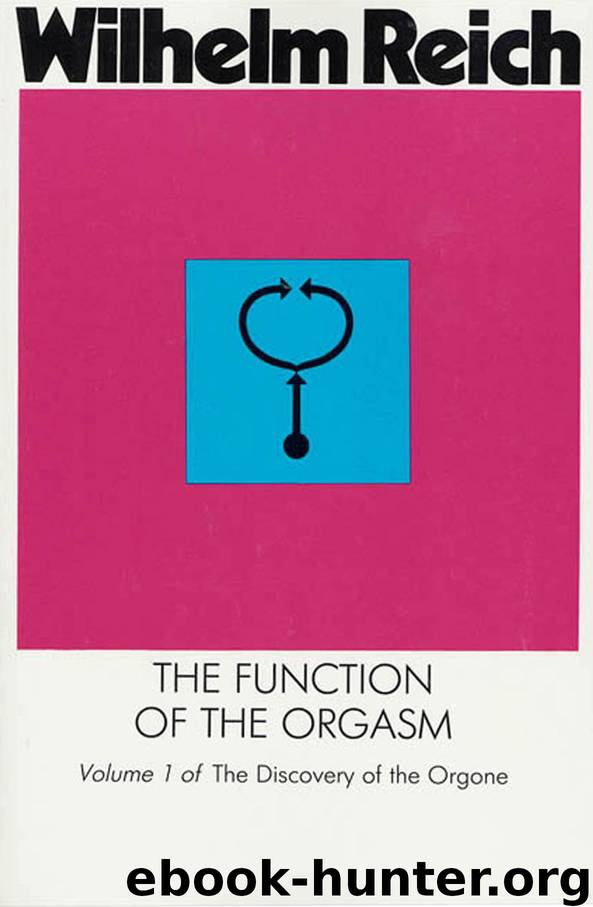The Function of the Orgasm: Discovery of the Orgone (Discovery of the Orgone, Vol 1) by Wilhelm Reich

Author:Wilhelm Reich [Reich, Wilhelm]
Language: eng
Format: epub
Publisher: Farrar, Straus and Giroux
Published: 2013-07-01T23:00:00+00:00
CHAPTER VII
THE BREAKTHROUGH INTO THE BIOLOGICAL REALM
The theory of the orgasm confronted me with this question: what is to be done with the sexual energy liberated from repression in the process of cure? The world said no to everything that sexual hygiene demanded. The natural instincts are biological facts. They cannot be done away with and they cannot be fundamentally changed. Like all living beings, man needs, first and foremost, the appeasement of hunger and the gratification of sexual needs. Today’s society makes the first difficult and frustrates the latter. There is a glaring contradiction between natural demands and certain social institutions. Man is immersed in this contradiction, leans more toward one side or the other, makes compromises that always backfire, escapes into sickness and death, or rebels senselessly and fruitlessly against the existing system. The human structure is molded in these struggles.
Biological as well as sociological demands are operative in the human structure. Everything that has social standing, title, and prestige champions the sociological demands against the natural demands. I was amazed that the overwhelming role of natural demands could have been so thoroughly overlooked. Even Freud, who of course had discovered very essential parts of these demands, became inconsistent. After 1930, the instincts were merely “mythical qualities” for him. They were “indeterminable,” though “rooted in chemical processes.” The contradictions were enormous. In clinical therapeutic work, the instinctual demands determined everything and society just about nothing. On the other hand there was no getting away from the fact that “society and culture,” representing the so-called reality principle, also made demands. True, the instincts unconditionally and overwhelmingly determined existence—at the same time, however, they had to adapt themselves to the sex-negating reality. True, the instincts derived from physiological sources. At the same time, however, the id had an Eros and a death instinct which are engaged in an eternal struggle. The duality in Freud’s concept of instinct was absolute. There was no functional connection between sexuality and its biological counterpart, the death instinct. The two were merely antithetical. Freud psychologized biology. He said that there were “tendencies” in the realm of the living which “intended” this and that. This was a metaphysical point of view. Its criticism was justified by the later experimental proof of the simple functional nature of instinctual processes. The attempt to explain neurotic anxiety in terms of the concepts of Eros and the death instinct was not successful. Freud eventually discarded the libido-anxiety theory.
The “partial drives” also created difficulties for Freud’s theory of the instincts. Each one of them, even those which led to perversions, were said to be biologically determined. Thus, whether he intended to or not, Freud ultimately gave credence to many views of hereditary science. And in Freud himself, the theory of constitution gradually began to replace the dynamic conception of psychic illness. If a child smashed a glass, this act was said to be the expression of the destructive instinct. If he often fell down, this was said to be the effect of the mute death instinct.
Download
This site does not store any files on its server. We only index and link to content provided by other sites. Please contact the content providers to delete copyright contents if any and email us, we'll remove relevant links or contents immediately.
Rewire Your Anxious Brain by Catherine M. Pittman(17589)
Talking to Strangers by Malcolm Gladwell(11878)
The Art of Thinking Clearly by Rolf Dobelli(8842)
Mindhunter: Inside the FBI's Elite Serial Crime Unit by John E. Douglas & Mark Olshaker(7834)
Becoming Supernatural by Dr. Joe Dispenza(7106)
Change Your Questions, Change Your Life by Marilee Adams(6641)
The Road Less Traveled by M. Scott Peck(6635)
Nudge - Improving Decisions about Health, Wealth, and Happiness by Thaler Sunstein(6633)
The Lost Art of Listening by Michael P. Nichols(6474)
Enlightenment Now: The Case for Reason, Science, Humanism, and Progress by Steven Pinker(6405)
Win Bigly by Scott Adams(6311)
Mastermind: How to Think Like Sherlock Holmes by Maria Konnikova(6236)
The Way of Zen by Alan W. Watts(5800)
Daring Greatly by Brene Brown(5641)
Grit by Angela Duckworth(4737)
Big Magic: Creative Living Beyond Fear by Elizabeth Gilbert(4723)
Men In Love by Nancy Friday(4325)
Flow by Mihaly Csikszentmihalyi(4052)
The Four Tendencies by Gretchen Rubin(4024)
